Tactical Breach Wizards review - whip-smart design with a generous spirit
Wands of change.
Suspicious Developments' latest builds a witty, wonderfully generous adventure around a smart, rewarding, and endlessly imaginative turn-based tactics core.
Tactical Breach Wizards starts with a bang - literally. Each mission, and even the game itself, begins with a flash of magic and the splintering of wood as doors are blown off their hinges with an endlessly satisfying boom. It's a stylish opener that never loses its air-punch thrill, a wonderfully cool moment in a game brimming with them - and just one of the things that makes Suspicious Developments' turn-based tactics game positively crackle with wit, energy, and charm.
We should probably start with the wizards though. Welcome to a world where magic-wielders are, if not exactly commonplace, far from clandestine. It's a world where Freelance Storm Witches moonlight as private investigators, where Necromedics can cure anyone of anything as long as they kill them first, where the military employs Navy Seers for their surprisingly useful one-second foresight, where the church has its own oppressive anti-magic police force, and where Traffic Warlocks are called Steve. There's some stellar world-building in Tactical Breach Wizards, as it blends urban fantasy with taut espionage thrills and military conspiracy, and it's further enriched by its lovable cast of magical misfits, its warm, witty dialogue, and a surprisingly gripping central yarn.
Suspicious Developments weaves its magic (both the literal kind and otherwise) around a core that, fundamentally at least, isn't all that different from the myriad post-XCOM turn-based, grid-based tactics games we've seen before. Throughout its 20-hour or so runtime, you'll guide your slowly expanding squad through a globe-hopping series of infiltration missions, each requiring you to complete a string of self-contained, single-room challenges. Sometimes you'll be storming a police station to rescue a prisoner, other times you'll move from carriage to carriage as you attempt to commandeer a speeding train - but the constants are the tightly constrained spaces you're working within, the strategically placed environmental hazards you're able to exploit, and the enemies you'll need to deal with along the way.
On the surface, Tactical Breach Wizards leads a familiar dance, following the genre's time-honoured rhythms of reconnaissance and execution as you first soak in your surroundings then start thinking your way around the deliberate limitations imposed by the likes of movement radiuses, mana reserves, and action points, ensuring every decision counts on your way to completing an objective. You might be asked to seal doorways to prevent reinforcements from pouring in before you make your escape, to clear the room and unlock a security door, or to take down a phantom-motorcade-flinging boss. And it's the thrill of a perfectly executed plan that - as with all its genre bedfellows - serves as Tactical Breach Wizard's propulsive force. But Suspicious Developments has some tricks of its own up its magical sleeve.
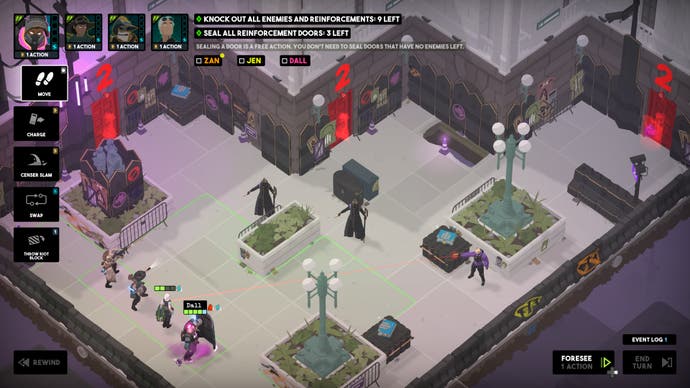
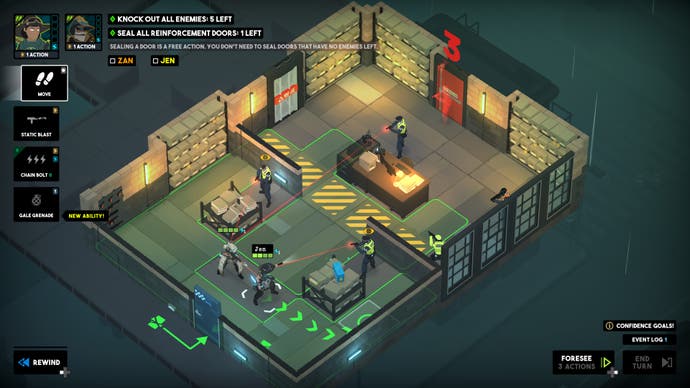
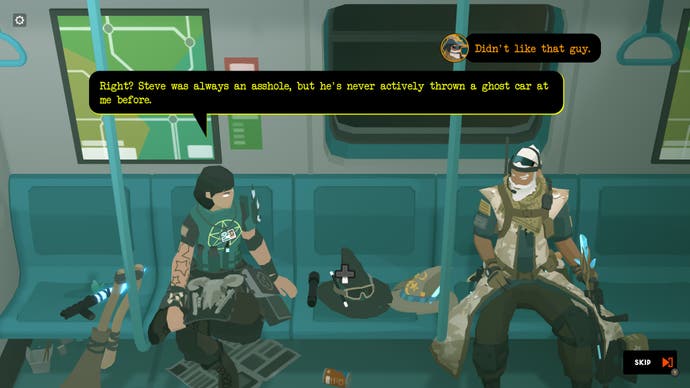
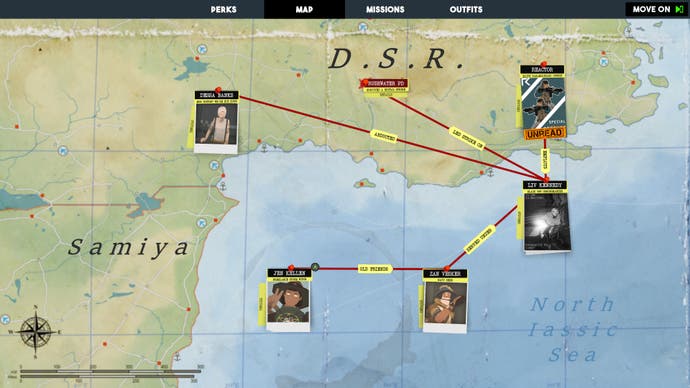
Tactical Breach Wizards builds a surprising amount of its action around indirect violence, where the focus is less on lining up a headshot as it is shunting enemies around the grid. Jen, the aforementioned Storm Witch, is perhaps the best example of this, with her arsenal consisting almost entirely of knockback magic – used to slam opponents into walls, into environmental hazards, or (given that Tactical Breach Wizards is absolutely obsessed with defenestration) out the window. Impact with an object, be it a bit of furniture or another opponent, causes damage, but there's also significant tactical advantage to be gained in simply nudging enemies around a level, given that the bulk of the game's other dovetailing abilities are specifically positional.
So, not only can Dessa Banks, the Necromedic, heal her allies by killing them first, she can unleash a flying skull (hi Gary) that'll damage anything he hits as he moves along a straight path. Alternatively, she can summon a wall-mounted portal that'll permanently swallow up anyone shoved into it. Even Navy Seer Zan, the most traditional member of the squad with his three-shot wand-gun-thing, slots neatly into this tightly interlinking framework with a powerful attack that'll only trigger if an enemy - whether they be lured or shoved - strays into its beam.
It does, perhaps, take Tactical Breach Wizards just a little too long to expand its starting abilities to the point that genuinely interesting synergies between characters begin to emerge. And while its opening few hours are pleasant enough – buoyed on by its ample wit and imagination – its limited early ability set and tightly regimented battle arenas make the experience feel more like a puzzle than a tactical sandbox. Eventually, though, as new abilities are unlocked and augmented with powerful perks, the tactical possibilities grow significantly. Soon, Jen is able to defy the constraints of each map by hopping on a broomstick and flying out the window to emerge elsewhere, while Zan gains an enemy baiting doppelganger. Later characters plug the remaining gaps in an already rich arsenal by introducing the ability to swap places with enemies, for instance, or to drag characters across the battlefield.
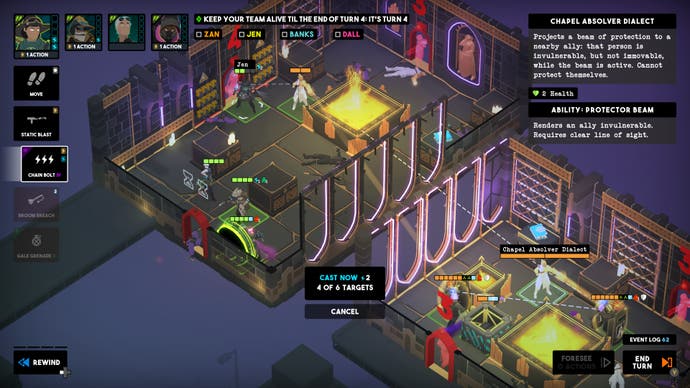
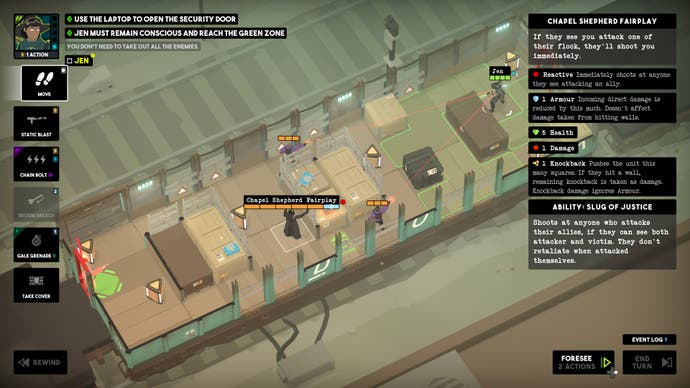
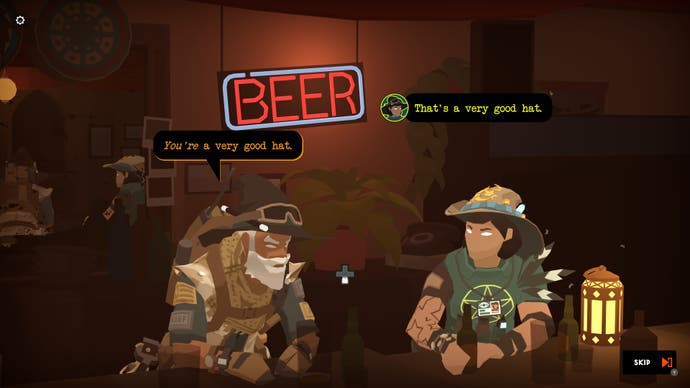
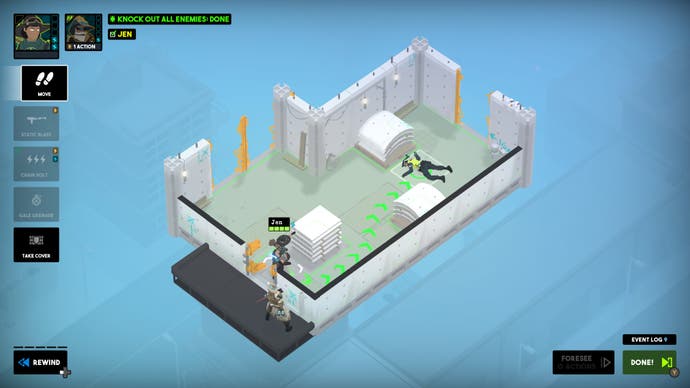
If the measure of a good tactics game is in the balletic flow of its choreography, then Tactical Breach Wizards is a gem, presenting players with a move set robust enough and complementary enough that they can put on one hell of a show. During one memorable mission, I managed to wipe out an entire roomful of enemies in a single turn by slinging Gary at a wall so he ricocheted through a group on the periphery, then followed it up with a portal behind an ordinarily near-impervious heavy artillery soldier. From there, all it took was a well-timed chain bolt from Jen to push the heavy out of play, and – in a move I admit I hadn't planned at all – shove everyone else through a window. Flawless execution!
Except, delightfully, Tactical Breach Wizards couldn't give a jot about flawlessness, and it's not all that fussed about victory either. Suspicious Developments has crafted an endlessly approachable game with a deeply generous spirit, where the sting of failure is always reframed as a temporary setback – an opportunity for renewed tactical experimentation, rather than a punishment to bear. That's primarily down to its three-phase deployment flow which, in a similar fashion to last year's stupendous stealth-tactics game Shadow Gambit, effectively reimagines the quick-save/reload tendencies of the genre as an essential mechanic, albeit more thoroughly integrated here.
At any point during your turn, you're able to trigger Foresight and watch the results of your actions unfold, and if you don't like what you see – if your plans don't quite play out as intended – you're free to rewind them step-by-step. It's only once you're ready to commit to a scheme and let the enemy take its turn that you're forced to bear the consequences of your actions. And if you're still struggling, Tactical Breach Wizard is happy to let you skip stages entirely.
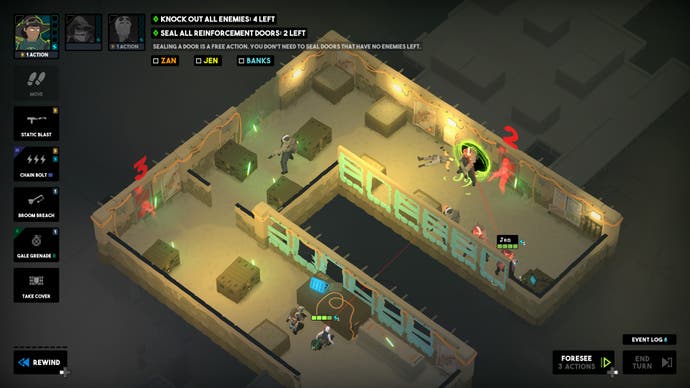
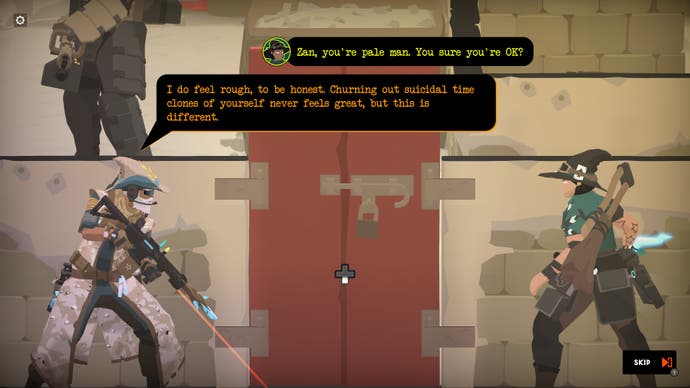
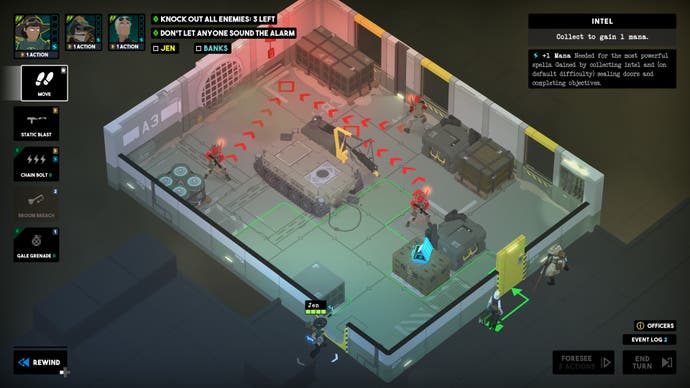
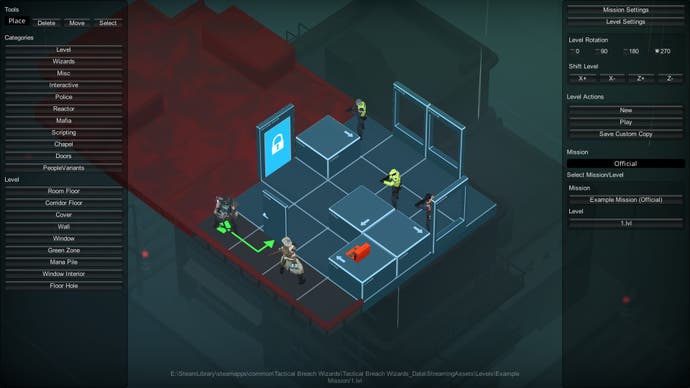
That does, of course, mean it's rare to find yourself in a place where victory is out of reach, but Tactical Breach Wizards is as smart as it is endearing, and constantly finds new ways to build tension in a world without an ever-looming fail state. Mostly, that comes from its relentless spirit of invention, each level throwing in a new design wrinkle that makes it impossible to rely on the same tactical rhythms for too long. When you're suddenly faced with, say, an enemy that prevents you from casting magic while it's looking at you, or an opponent that can't be harmed while it's being shielded by a foe elsewhere in the level, there's ample excitement to be found simply in learning to adapt to that new unknown.
But if it's masochism you want, Tactical Breach Wizards also features customisable difficulty settings and optional character-specific challenges for each mission, forcing you to apply your burgeoning toolkit in specific or unusual ways (and unlocking some snazzy outfits as you do). It's generous to a fault, not just in the way it accommodates different playstyles and ability levels, but in its abundance of stuff. Its core campaign and its impressively refined tactical action are good enough that it doesn't need its oodles of optional side missions – its survival maps, or its dream missions unfolding inside characters' heads. It doesn't need optional dialogue scenes for those wanting to learn more about its characters between key story events, or a level editor, or its post-mission interludes, where you pin new clues to a map then form fresh connections with bits of red string. And it doesn't need such rich world-building, or such a thrillingly intricate plot, and it doesn't really need to start each mission with such a hilariously showy boom.
But Tactical Breach Wizards does all these things, because it can, because they're cool, and because each new layer, each extra bit of texture, makes the experience all the more special. And it really is a treat. A carefully streamlined, wonderfully orchestrated, and richly rewarding game of tactical exploration that's as warm, witty, and welcoming as it smart. Even if you've baulked at the genre in the past, take a look at Tactical Breach Wizards - it's got a projectile skull named Gary, a Less Lethal Pyromancer with only slightly rubbish flames, and a defenestration kink for the ages, which might just change your mind.
A copy of Tactical Breach Wizards was provided for review by Suspicious Developments.


